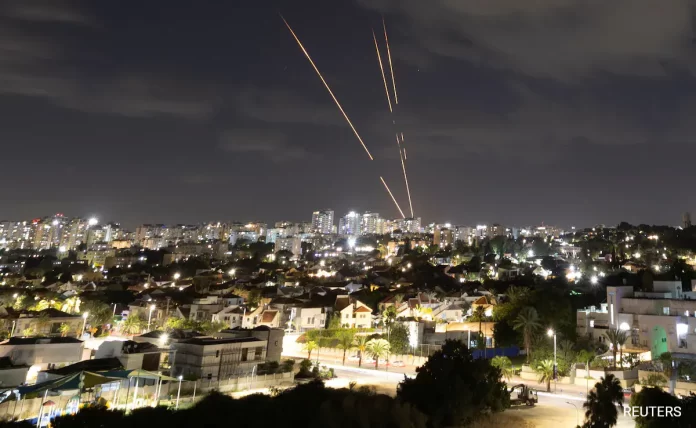On Tuesday, Iran launched a missile attack on Israel, sending waves of alarm across the country. As the warning sirens rang out, civilians rushed to find shelter, seeking safety from the missiles clashes by Iranian forces. This act was a response from Iran to the earlier killings of senior commanders from its ranks, a retaliation that has significantly raised the level of tension in the region.
Alarms Across Israel as Missile Clash Begins
The Israeli military quickly responded by instructing its citizens to remain in secure, protected rooms as missile strikes were expected to continue. With the potential for widespread damage from the ballistic missiles, the situation was deemed critical. However, after the missiles had passed, the military later issued an all-clear signal, advising that the threat had diminished and that residents were free to leave their shelters. In the aftermath of the attack, Israel firmly declared its intention to retaliate against Iran, stating that it would do so “at a place and time of our choosing.”
Economics of War: Israel Spends $1 Billion on Countering Drone Attack of Iran
Iran’s Response and Further Threats
In reaction to Israel’s vow of retaliation, Iran’s military forces, particularly the powerful Guards, issued their own warning. They threatened “crushing attacks” should Israel retaliate against the missile strikes. This declaration by the Iranian Guards signals the seriousness of the current standoff, where both nations are prepared for further confrontations, adding to the volatility in the region.
The tension escalated after Israel’s military reported that the missile attacks were anticipated to be widespread, and civilians were advised to remain in safe locations. The anticipation of these strikes was a significant moment, signaling that both nations were on high alert for potential conflict. As the situation developed, Iran’s leadership seemed intent on sending a strong message through its missile launch, emphasizing their capability and willingness to respond to perceived provocations.
Background of Escalation
The missile exchange came after a series of events that had already heightened the tension between Israel and its neighboring regions. Israeli troops had recently launched ground raids into Lebanon, marking one of the largest escalations in the region since the Gaza conflict erupted a year ago. These operations targeted areas with Hezbollah presence, and the killing of Hezbollah members further added to the already tense situation.
Israel’s involvement in the assassination of key leaders has brought the ongoing conflict to a critical turning point. Hezbollah’s response, primarily fueled by these events, has been closely linked to the broader confrontation between Israel and various resistance movements in the region. Hezbollah’s Secretary-General was among those targeted and killed in a major aerial attack that involved multiple bombings in the southern suburbs of Beirut. This assassination followed a heavy campaign that resulted in hundreds of casualties over a 24-hour period. Notably, Hezbollah’s military operations had already been hindered by a series of covert attacks, including booby-trapped communication devices.
Ukraine Sanctions Russia, Iran, and China Amid Ongoing Conflict
Despite these losses, Hezbollah continues to maintain significant influence and military capability, making the situation increasingly unpredictable. The conflict has also seen the involvement of other players, such as Hamas, further complicating the dynamics of the region. Both Hezbollah and Hamas have been key actors in the ongoing resistance against Israel, and this recent escalation threatens to further destabilize the Middle East.
Israel’s military strategy aims to divide its war efforts, focusing on decoupling the Gaza conflict from the tensions in Lebanon. By escalating pressure on Hezbollah in Lebanon, Israel hopes to reduce Hezbollah’s support for Hamas. However, this approach may not yield the desired results, as Hezbollah remains resilient in its ability to continue its attacks. The group’s rocket fire on northern Israel, despite these strikes, has kept Israel from securing full control over the situation, especially regarding evacuations and military operations in the region.
The Broader Impact on the Region
The current missile clash between Iran and Israel not only marks an escalation between the two nations but also signals broader regional involvement. Hezbollah, despite suffering significant leadership losses, has continued its operations, showing that it remains a formidable force in the region. Israel’s goal of weakening Hezbollah’s military capabilities faces significant challenges, as the group has shown resilience in adapting to Israeli strikes.
Furthermore, the involvement of Iran in this missile exchange highlights the interconnected nature of the conflicts in the region. Iran, a long-time supporter of Hezbollah and Hamas, remains deeply invested in the ongoing battles against Israel. The missile attack from Iran serves as a clear message that any Israeli action in the region will be met with force.
With both Iran and Israel standing firm in their positions, the situation in the Middle East remains precarious. The potential for a larger conflict looms as both sides are unwilling to back down, and each new action by either side risks triggering further escalations.
In conclusion, the missile exchange on Tuesday underscores the deep-rooted tensions between Israel and Iran, with both nations seemingly prepared for further conflict. As the situation continues to unfold, the focus remains on the immediate actions of both military forces, as well as the broader implications for the region’s stability.


